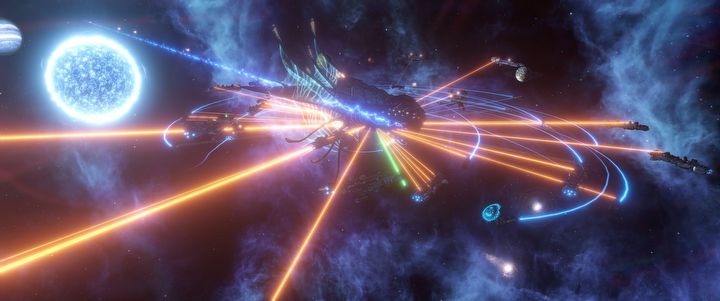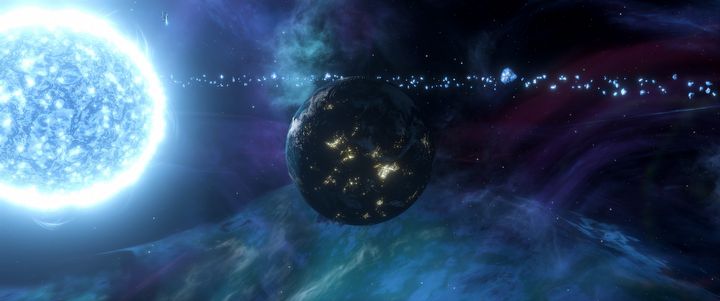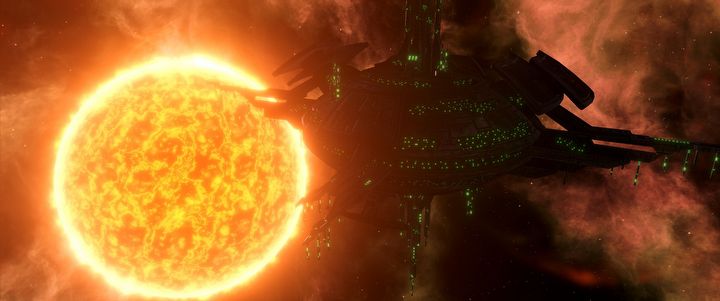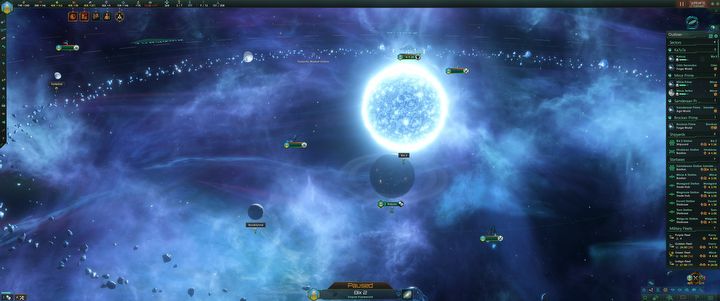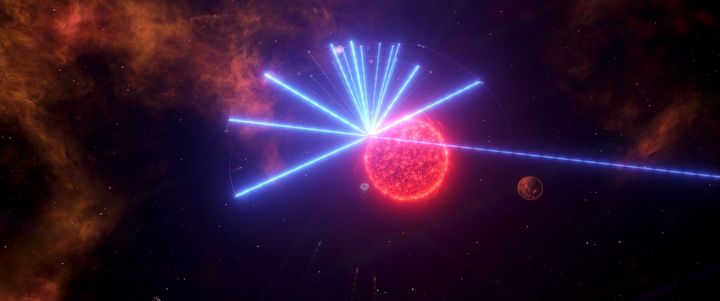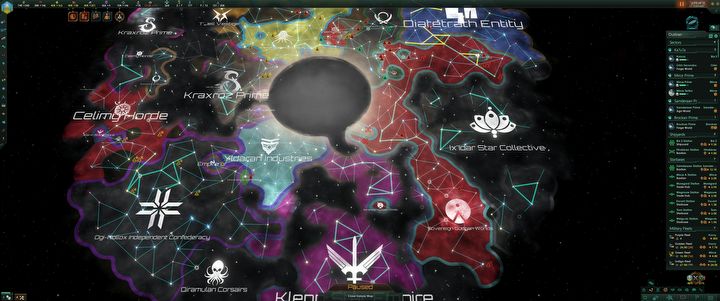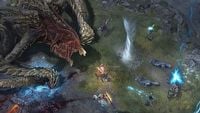“We create the games. You create the stories.” - Interview with Stephen Muray about Paradox Interactive and Stellaris
We asked Stephen Muray, Game Director of Stellaris, a few questions about the franchise, its future and, maybe most importantly, will we survive contact with an alien civilization.
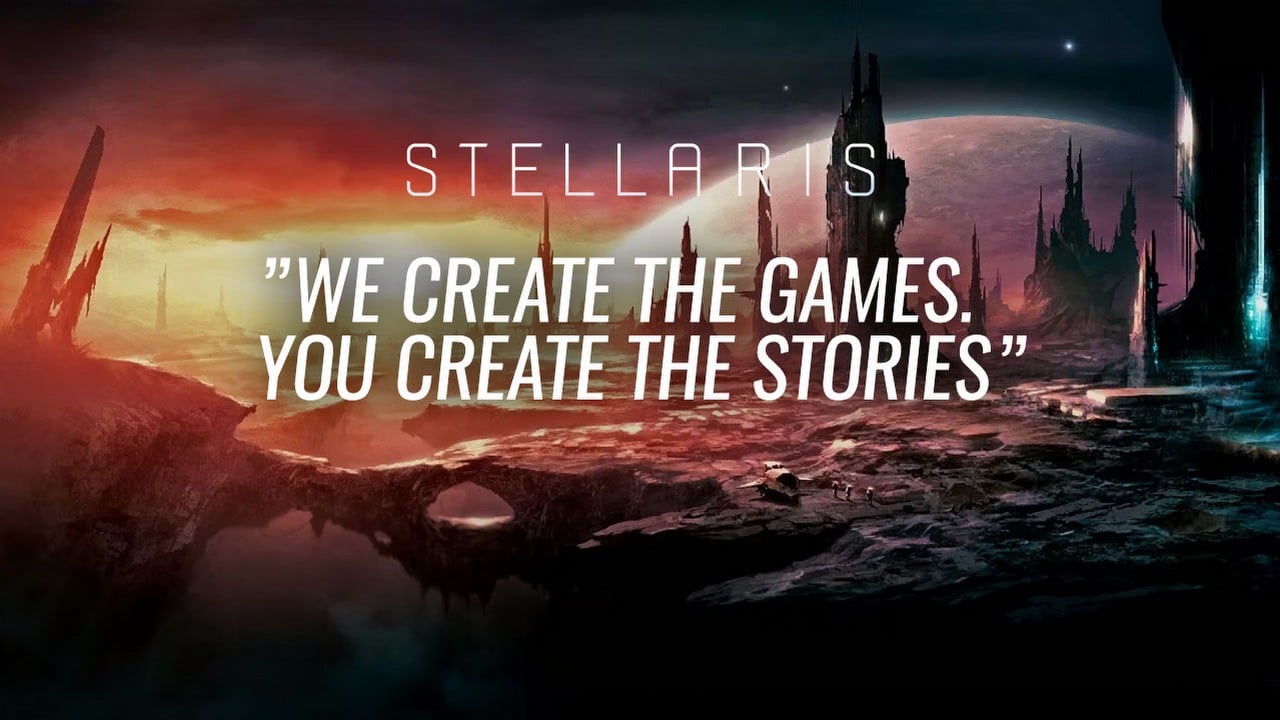
Since the first time I flew into space with Paradox Interactive, which was around the release of the Stellaris expansion Utopia (i.e. 2017), I have been regularly returning. Stellaris, 2016's brilliant, challenging and immensely rewarding space strategy didn't start my love for interactive cosmos, but it solidified it. When many, many years ago I was exploring the depths of space on an old PC in Freespace 2, games like Master of Orion have already been strongly rooted on the market – these were challenging sci-fi economic games that try to simulate the development of civilization in the extreme conditions of space. Stellaris has taken this heritage and turned it into art. It's the best 4X space game out there, and for me, it's the best space exploration game ever.
As the new DLC for Stellaris, First Contact, released I decided to ask Paradox Interactive about the future of the franchise, its significance and condition, as well as suggestions on how we should deal with the alien invasion. My questions were answered by Game Director Stephen Muray, the man who largely defined Stellaris and what it has become in these six years.
- Stellaris yesterday and today
- Space sandbox without borders
- Will Stellaris get more linear scenarios?
- Stellaris and community mods
- Is Stellaris 2 even planned?
- Do we survive contact with an alien civilization?
Stellaris yesterday and today
Stellaris is one of the games showered in DLCs and add-ons. It's interesting because players are often apprehensive about these, assuming that an unfinished product was deliberately released and content was cut so that it can be sold later. This may be the case with other games, but not Stellaris. The creators not only kept releasing new content for 7 years – they also developed the existing one. The old content was constantly being reconfigured and rethought, so if you bought a game in 2016 and came back to it in 2023, you'd basically find that you got a brand new game for free. Sure, it looks the same – it's Stellaris, after all – but all the mechanics have changed several times over. They were expanded, deepened and adapted to new content. This way, Stellaris has become not only a huge simulator of space exploration, but also a project that you learn anew from patch to patch, as well as one where you always – even after hundreds of hours – discover something new that you haven't seen before.
By the way, if we're talking patches – the developers also care for those who don't want to spend money on new DLCs and provide them with patches that add new content free of charge. This way, even if you haven't bought any expansions, you get to experience the key changes. This is an interesting and bold business model, as it requires the player to learn and focus every time they return to the game. I brought this up in the interview with Stephen Muray.
Stephen Muray, Stellaris Game Director: At Paradox, we have a tradition of maintaining our games for many years, expanding and improving them as time goes on. While this does mean that systems sometimes need to be relearned, it also means that our teams feel free to explore or expand the systems that were not possible or even considered before launch; we aren’t forever bound by the decisions of the past.
Stellaris, in particular, has been willing to dramatically change some systems for various design reasons – whether it be the tile based planets being changed to the job system in 2.2, intel being added in 3.0, or the pre-FTL interaction updates coming in 3.7.
Since 3.1, we’ve had the Custodian Team dedicated to regularly making improvements to the game, changing and adjusting things every quarter to keep things fresh and to satisfy the desires of the players. The Custodians get their direction partially from me as Game Director, but the combination of community requests and their own personal passion provide most of the tasks they undertake.
You see, Paradox is not only thinking about new content – they have also set up a special team that focuses on the development and improvement of old content, based on feedback from fans. And it's not about patching bugs – it's about improving the mechanics. I remember coming back to the game after patch 2.2 and finding out that I had to relearn how to develop my planets because building was revamped.
Space sandbox without borders
Space exploration in Stellaris is so unpredictable. We never know where our next playthrough will take us. Thanks to this, the game enjoys basically infinite replayability. The stories that can be written here are beyond imagination.
For example, imagine leading a faction of xenophiles (i.e. benign towards other races). You follow a diplomatic and rather pacifist approach, and build armies only for defense. At some point, you find out that some other civilization that you haven't even discovered yet has been destroyed by a cosmic invader and refugees who miraculously survived are arriving on your planets. Since you're a good alien, you accept them (though, of course, you can refuse). So, you give the refugees jobs, voting rights, and generally have a very nice and happy space commune. You notice, however, that refugees don't quite feel comfortable on your planet – they prefer more tropical climates. So, you colonize another planet with better conditions for them and resettle them there. Earthquakes plague the new planet, but otherwise it's a real paradise. The refugees are having a great time, until at some point, the planet explodes, killing all the survivors of the war – and a huge space dragon emerges from inside. It turns out that you have colonized and transferred your refugees to a dormant leviathan egg. I told Stephen Muray about this and asked him what stories had he seen happen in this space sim:
Stephen Muray: At Paradox, we have a saying, “We create the games. You create the stories.”
During the development of First Contact, I was playing a truly idealistic Broken Shackles empire. We were a beacon of liberty and peace, diplomatically spreading our message and reaching out appendages in friendship to all those around us, while we tried to reconnect to our homeworlds. I finally made my way to my primary species homeworld, but instead of a joyous reunion… I found a tomb world.
I wasn’t fast enough. They had accidentally triggered a machine uprising that took the form of a Determined Exterminator, and the only survivors of my species were those on my worlds or those enslaved by Minamar Specialized Industries.
Needless to say, my empire’s philosophy towards robots changed overnight, and we prepared for total war. From that point on, we no longer asked the other empires to free their slaves, it was an order.
These sorts of stories that often end in tragedy are the things that attracted me to Paradox games in the first place. Systems that produce these emergent narratives are one of our greatest strengths of our grand strategy games, and in Stellaris, they really make the galaxy feel alive.
If you haven't played Stellaris, take my word for it – the possibilities the game gives you seem limitless. The outcome of your game is always different – you can start the game as a down-to-earth materialist and end up as a spiritual race of psionics. The space anomalies (i.e. random events in the game) that we encounter were inspired by the greatest creators of sci-fi worlds: Dick, Lem, Asimov, Gibson, Strugacki, Clarke and Herbert. Many times you will be shouting things like, "Oh gosh, I've found a sentient ocean!"
The gameplay possibilities are endless, because the developers have been working on the game for so many years – any new idea can get to be implemented eventually. I asked Stephen if there were any ideas that, for various reasons, were impossible to implement due to lack of time or resources, or other reasons:
One of the nicest parts about our long-term development and support model is that we’re able to iterate and change things as time goes on, so it’s rare that we can’t change something if we make a pressing case for it. We do have to pick and choose what we want to work on for each release though, so we have to consider how much of a benefit the game would gain from refactoring a system. Ground Combat is an example of a system where the overall benefit to the game is likely to be less than the amount of work it would take to revamp it, so it’s low priority at this time. I’d rather spend the resources improving aspects of the game that will have a bigger impact.
Will Stellaris get more linear scenarios?
Stellaris is a game that resembles RimWorld in terms of design. The creators give us certain resources, motives and fragments of story, and we shape the subsequent plot and the story of our faction with our decisions. Origins have been introduced to the game, forming a kind of backbone of the plot – there are also certain chains of quests that we can encounter randomly, which further enrich the story. However, Stellaris remains open-ended – there's no plot that starts from point A and ends at point B. I asked if the creators were ever tempted to make a something like slightly more "linear" plots, or simple, fictionalized scenarios with specific objectives that the player must achieve:
Stellaris is all about a galaxy of mystery and wonder, with exploration as a key theme – we want you to tell us what happens next, but also to wonder what’s going to happen next. Many of our systems are set up to enable these sorts of emergent narratives, where we provide the pieces that interlock with other pieces so each game can be its own special story.
We always want to keep the primary control of the story in your hands, though recently we’ve experimented with some more narrative arcs – the Knights of the Toxic God Origin from the Toxoids Species Pack contains a quest that spans a hundred years or so, and all three Origins in the First Contact Story Pack are fairly open but still provide some clear narrative allies, enemies, and goals.
Nothing is off the table though – we’re always considering other ways of expanding our games, it’s possible that at some point we may want to introduce more structured scenarios with clear victory goals.
So perhaps – and this is quite big news for the fans of the game – Stellaris will one day feature fictionalized scenarios where we, the players, will take part in an epic space story written by the creators of Paradox Interactive. However, this will never be the mainstay of the game, because this is an open-ended and inherently unpredictable story shaped by us, telling about the race that we created ourselves.
Stellaris and community mods
If, by some miracle, you get bored with the vanilla content, it's easy to try one of many great mods created for the game. The Stellaris community is alive and well, and the creators even help them maximize their output. So, if you want to turn Stellaris into Star-Trek, Star Wars or Warhammer 40k, you're welcome to do so.
We have an excellent modding community, and I want to thank them for creating so much great content. The Stellaris modders let our players satisfy different fantasies we do, and that adds a huge amount of replayability.
We do what we can to support them, with things like early access to content so they can get updated to the newest updates after a release, and thinking about how to make new features flexible enough to support them during implementation.
Since I personally generally play on in-development builds that include future releases, I’m usually playing “vanilla”, as mods obviously aren’t updated yet for unreleased builds. I quite like mods that change the way the game plays though, whether it be new game modes, ones that add more diversity to existing systems, and some of the frankly bizarre but amazing maps that are out there (like the Grid and Circle galaxy mods).
Is Stellaris 2 even planned?
I knew that asking the developers about Stellaris 2 didn't make much sense. The first part, although many years have passed, is still doing great and looks awesome. I asked another question instead: I wonder if there's a point – or a criterion – where you say, all right, Stellaris 1 has reached the peak of its capabilities and it's time to move on. What would that point be, hypocritically?
I feel that we’re currently in a golden age of Stellaris – we still have so many stories to tell and wonders to explore. The addition of the Custodian team has given us the opportunity to bring old content up to our current standards, and make the game better every quarter.
There’s a serious advantage in being a game where any and all sci-fi stories or tropes are within our reach – there’s just so much more content left that we can add before we decide that we’re done with this iteration.
So you can see that Stellaris 2 won't be coming anytime soon. But in all truth, while we always think a sequel is a good idea, isn't Stephen Muray right? The game is constantly in development – every few months, it gets these huge patches, DLCs and add-ons that force players to come back to the game. It's impossible to get bored and hard to say that we need Stellaris 2 at all.
Do we survive contact with an alien civilization?
The last question I asked was half-joking, half-serious. I decided that there's no better person to address it – Paradox is, after all, a group of people who have been creating a game about aliens for years on end. Do you think the first alien civilization to come to us will be more like fanatical purifiers or fanatical pacifists? Any advice concerning first contact?
If intelligent life comes to visit, I certainly hope that they’re the pacifists.
Any civilization that is capable of making it here is likely to be so advanced that we will largely be helpless before them. Hopefully they’ll view us as curiosities worth studying and preserving. As a wise man said in 1993, “We’ll make great pets.”
The Origins in the First Contact Story Pack don’t have wonderful first encounters with alien life. Both Broken Shackles and Payback have suffered from their interactions with the cruel Minamar Specialized Industries, but they retain hope. Hope that they can make the galaxy a better place in the first, and hope for revenge for the latter. Fear of the Dark explores the line between paranoia and prudence after their solar system was attacked by an unknown foe. I’m looking forward to seeing the stories you all tell about them, as well as your own interactions with the pre-FTL civilizations you encounter.
We can start your stories now because the First Contact Story Pack, the new DLC for Stellaris, is available since March 14, 2023. I am curious myself what stories I will craft this time. Maybe I'll do better than last time and my civilization won't end to the accompaniment of nuclear explosions.
Disclaimer
Thanks to TriplePoint company for making this interview possible.
- Stellaris Development Will Slowdown as Paradox Considers What Future of 4X Space Strategy Should Look Like
- Paradox's big space strategy is about to get a lot bigger. Stellaris 4.0 gets release date, and BioGenesis expansion will provide „power over life itself”
- Number of desyncs in Stellaris skyrockets after BioGenesis and 4.0 update. Can you do something about that?
4

Author: Matthias Pawlikowski
The editor-in-chief of Gamepressure.com, associated with the site since the end of 2016. Initially, he worked in the guides department, and later he managed it, eventually becoming the editor-in-chief of Gamepressure, an English-language project aimed at the West, before finally taking on his current role. In the past, a reviewer and literary critic, he published works on literature, culture, and even theater in many humanities journals and portals, including the monthly Znak or Popmoderna. He studied literary criticism and literature at the Jagiellonian University. Likes old games, city-builders and RPGs, including Japanese ones. Spends a huge amount of money on computer parts. Apart from work and games, he trains tennis and occasionally volunteers for the Peace Patrol of the Great Orchestra of Christmas Charity.
Latest News
- End of remote work and 60 hours a week. Demo of Naughty Dog's new game was born amid a crunch atmosphere
- She's the new Lara Croft, but she still lives in fear. Trauma after Perfect Dark changed the actress' approach to the industry
- „A lot has become lost in translation.” Swen Vincke suggests that the scandal surrounding Divinity is a big misunderstanding
- Stuck in development limbo for years, ARK 2 is now planned for 2028
- Few people know about it, but it's an RPG mixing Dark Souls and NieR that has received excellent reviews on Steam, and its first DLC will be released soon
